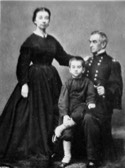The Latimers - Person Sheet
The Latimers - Person Sheet
Birth Date14 Jun 1805
Birth PlaceLouisville, Jefferson County, Kentucky
Death Date27 Oct 1871 Age: 66
Death PlaceNice, Alpes-Maritimes, Provence-Alpes-Côte d'Azur, France
FlagsCivil War-USA, Historical, Interesting, Military
FatherANDERSON, Richard Clough (1750-1826)
MotherCLARK, Elizabeth (1768-)
Misc. Notes
Robert Anderson was appointed a cadet to the United States military academy, and was graduated from West Point in the class of 1825, receiving commission as 2d lieutenant in the 3d artillery. He was stationed at the St. Louis arsenal when the Black Hawk war broke out, and joined General Atkinson as assistant inspector-general on his staff. In his official position he twice mustered Abraham Lincoln out of the service and in again. He also had charge of the Indians captured at Bad Axe, and personally conducted Black Hawk to Jefferson barracks. His adjutant at this time was Lieut. Jefferson Davis. He was instructor at West Point from 1835-'37, served in the Seminole war in 1837-'38, and was brevetted captain. In the Mexican war he served on the staff of General Scott as assistant adjutant-general, and was wounded in the battle of Molino del Rey. He was made major of the 1st artillery in 1857, and took command of the troops stationed in Charleston harbor with headquarters in Fort Moultrie, November 20, 1860. When the political disturbance in South Carolina reached the point of warlike demonstrations he demanded reinforcements in order to defend the government property. Failing to receive support he on the night of December 26, 1860, spiked the guns at Fort Moultrie and burned the carriages, and withdrew the eighty-three men of his command to Fort Sumter, where he made his famous defence. On April 14, 1861, he surrendered the fort to the South Carolinians, marching out with the honors of war, after defending it bravely against a bombardment of thirty-six hours. He sailed with his men for New York city the next day, where he received from the authorities and the nation the honor and thanks justly due for his brave action. President Lincoln immediately promoted him brigadier-general in the United States army, and assigned him to the department of Kentucky and subsequently to the department of the Cumberland. His health failed him and he was relieved from active duty in October, 1861, and resigned from active service October 27, 1863. He received promotion as brevet major-general, February 3, 1865. In 1869 he went abroad, hoping to recuperate his health. General Anderson was one of the founders of the Soldiers' Home in Washington. He translated and adapted from the French "Instructions for Field Artillery, Horse and Foot" (1840), and "Evolutions of Field Batteries" (1860).



